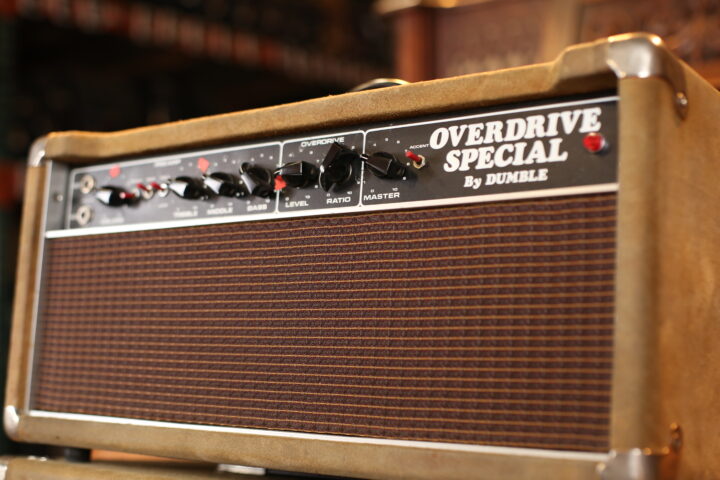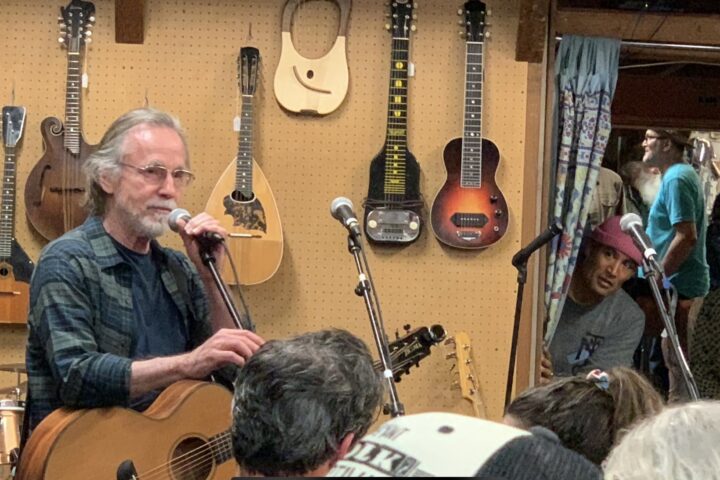A short excerpt from our Ben Harper feature in the new, Fretboard Journal 53rd issue.
“Just when I think I’ve kind of hit a plateau, then there’ll be your occasional breakthrough,” Ben Harper tells me. “So I still think I’m progressing.”
At that moment, we are talking about skateboarding, not music. But his sentiment applies just as easily to his sonic output as it does to his kickflips. His 2023 release, Wide Open Light, is a breakthrough of sorts, a stripped-down affair: Ben with a couple of his favorite guitars, one great piano, and a microphone. It’s unlike his projects with the Relentless 7 or Innocent Criminals or really anything else he’s ever done. It’s a throwback: a timeless singer-songwriter album filled with great guitar tones and poignant songwriting.
Our conversation takes place at Harper’s LA gear locker, which is lined with hundreds of historic guitars. I’m looking at racks that house his legendary Weissenborn steel collection, his signature Ashers, and some of his Dumble amps. Even the spare string corner rivals that of any mom-and-pop store. It’s a staggering array of gear, and, of course, it barely scratches the surface of his quiver. Despite the vast choices, when it came to this record, in classic songwriter fashion, Harper whittled it down to just a couple of his favorite instruments.
FJ: Let’s talk about Wide Open Light. When did you actually begin recording it?
BH: I began recording this record just out of the pandemic, which would’ve been 2021 and a half or something like that. And Bloodline Maintenance was on its way out, and this record was done at the same time. I was working on two records at once.
I was thinking about making it a double record, but they needed their own individual attention and sonic space. I sequenced the records accordingly.
I’ve been wanting to make a songwriter’s record forever, something that turns its back on conventional production in every sense of the word. Mitch Rowland from Harry Styles’ band said something that greatly influenced this album. I was just playing different songs. He said, “Ben, you especially of all people should never forget that a guitar and a voice is enough.” Common music marketing would challenge the senses in that regard.
Again, I had made a record just with me and a lap steel guitar [2020’s Winter Is for Lovers], so it’s not as if I didn’t know that. But doing it with lyrics and songs that are three or four minutes, sonic stories, that’s a whole different bag. And it was a wonderful reminder that I’d never done an entire album with that soundscape. Even my first record, Welcome to the Cruel World, had plenty of other instruments all over it.
So this is the first record I’ve ever made that is really just me and a guitar with embellishments. I’m really proud of the production restraint and letting the songs be their own producers, in a way. It’s produced by Jason Mozersky, who greatly helped me. I would try different guitars; I would try different roundnecks and different attempts at embellishing. He was like, “You need this…you’re acoustic…you’re too close to the mic…you’re too far away from the mic…”
His feedback on this record was crucial in its identity.
And then Danny Kalb, as well, engineering and producing across the board and making sure that that sonic identity that Jason and I were working on carried through to the overall mix, the overall dynamics. Nonetheless, it still feels like production by omission. I wanted it to have a Nebraska texture to it: not lo-fi, not hi-fi, but a microphone and an instrument and a voice.
FJ: Which is so hard to do. Springsteen’s Nebraska is one of the few that works that way. Think of all the great Townes Van Zandt or Warren Zevon records that have been tarnished a bit by production that went too far. Jesse Winchester, there’s a million of them…
BH: And Ben Harper [records], at times. Listen, I’ve had to work my way back to making this record. Again, thanks to Mitch for going, “Hey man, remember…” Because “Yard Sale,” the song with Jack [Johnson], is written in an Everly Brothers vein, if I dare go so far.
I grew up with that music, so that’s somewhere back there. And so when it was coming out, I was like, “Oh, this has an Everly Brothers feel. And Jack and I harmonize on there…why not take that all the way?”
Of course, I put a drummer and bass and everything on it [first] and I had to kick it off. I fired every last one of them. It came right back to Jack and I. That’s when I knew this record was going to be as sparse as it is.
FJ: Maybe this is always happening and it just gets lost in the production, but you seem to be having fun with the lyics: “I’ve got just one more chain to break / I’ve got just one more change to make” on “One More Change” or the “all sales final” line in “Yard Sale.” You take a lyric and subtly adjust it, and it becomes a really catchy song.
BH: Thank you for catching that because there’s still a lot of open road I feel for exploring songwriting, even after as much water as [there is] under the bridge.
If you’re going to pick up a guitar at this stage in the evolution of the instrument, it’s as intimidating a prospect… There’s just been so much done in the canon with the instrument, to date. That’s really one of the reasons I play lap steel.
There was a time at my family’s music shop when I was playing a lot of roundneck, and we have electric guitars in our family’s archive. [I] was not so much looking for a sonic identity but trying to find what sonic identity was looking for me. When I found my way to lap steel, that’s where I felt I could define myself. I found the instrument that expressed what was going on inside of me.
And that’s been one of the joys of lap steel. Of course, there was a lot done, like Hawaiian or the blues, but it was still a distant relative of guitar at the time I really was diving in. When it comes to songwriting on roundneck and playing roundneck guitar, you step into that and you’re going to have to step strong because there’s already been a world and a universe created. The lap steel felt like there was a universe yet to be created.
So to cut back on how that relates to this album: I felt like having so much time to sit still through a pandemic and so much introspection, if there was one thing that came out of it for me, it was a renewed perspective, a renewed appreciation and almost a reset. That kind of kicked things into gear for it feeling fresh for me as a songwriter.
FJ: You mentioned your Taylor being the foundation for the whole thing? Is that your go-to guitar at home?
BH: It’s my go-to guitar at home.
FJ: What makes your [Builder’s Edition 517] Taylor so special?
BH: It’s got its own mysterious quality. It’s just a mysterious guitar. And, of course, who knows what I’ll be onto in two years, right? But it’s got staying power. That Builders Edition has the business.
The neck is stick-straight, and it stays stick-straight no matter how hot, no matter how cold…it’s not moving. I usually like guitars that talk back to you. But when touring, you want that dependable action not to wane. And its dependability is only matched by its sonic prowess, and that’s a great combination.
FJ: What was the setup like recording this record? We talked about how hard it is to just nail a pure guitar and voice. How many mics? What was the room like?
BH: The room was sort of a studio, right around the size of this room. I’m playing and singing, that was its own thing. It’s like, “You’re going to get the take.”
FJ: One track?
BH: Get the take…one track. By the way, Jack’s guitar playing on “Yard Sale…” Jack has been putting in the time to learn slack-key, and his slack-key playing is fantastic. I was beholden to some of the mixes: If you want more guitar, you’re going to get more vocal.
So there was a balance that was part of the mixing process. Danny Kalb contributed in a major way to making sure that neither got lost or swallowed the other up.
FJ: Where are you at with guitar buying right now? I’m staring at a wall of, I don’t know, a hundred-something guitars. Are you still constantly looking?
BH: It never ends. It never ends. I promised my mom and my wife that I would stop buying Weissenborns. But this Style 4 came up and it was just the sweetest Style 4. It was four grand. The market is down for all things guitars, and it was the right price and it was in mint condition. I had to have it. Wobbly “buy it now” fingers, as we call it in my world.
It never ends because, sure enough, it had a special tone. I wrote half a song on it the minute I got it…you are always reaching. You have to be, don’t you?
Order the issue or subscribe to get the full feature.


